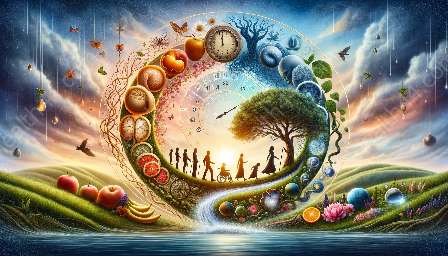As we age, our fertility and reproductive health undergo significant changes that can impact our ability to conceive and maintain a healthy pregnancy. This topic cluster explores the interconnection between fertility, aging, and reproductive health, shedding light on the challenges and opportunities associated with these natural processes.
Fertility and Aging: A Complex Relationship
For many individuals and couples, the decision to start a family often coincides with aging. However, as we age, both women and men experience changes in their reproductive capabilities, which can influence fertility and the likelihood of conceiving.
Understanding Female Fertility and Aging
Female fertility is closely linked to age, with a gradual decline in reproductive potential starting in the late 20s and accelerating in the mid-30s. As women approach their mid- to late-30s, the quality and quantity of their eggs tend to decrease, making conception more challenging. Additionally, the risk of miscarriage and pregnancy complications increases with age, highlighting the impact of aging on reproductive health.
Exploring Male Fertility and Aging
While the impact of aging on male fertility is less pronounced compared to women, men also experience age-related changes in reproductive function. Advanced paternal age has been associated with a higher risk of certain genetic disorders in offspring, emphasizing the importance of considering male reproductive health in the context of aging.
Reproductive Health in Relation to Aging: What You Need to Know
As individuals age, their reproductive health undergoes a myriad of changes that extend beyond fertility. Both men and women may experience age-related conditions that can impact their reproductive abilities, including hormonal imbalances, decreased libido, and sexual dysfunction.
Female Reproductive Health and Aging
Menopause, a natural biological process marking the end of a woman's reproductive years, typically occurs in the late 40s to early 50s. This transition is accompanied by a range of symptoms, including hot flashes, mood disturbances, and vaginal dryness, which can affect sexual health and overall well-being.
Male Reproductive Health and Aging
Similar to women, men also experience age-related changes in reproductive function, including a gradual decline in testosterone levels and an increased risk of conditions such as erectile dysfunction and prostate enlargement. These factors can impact not only fertility but also sexual satisfaction and overall reproductive health.
Optimizing Reproductive Health as We Age
While aging presents natural challenges to fertility and reproductive health, there are proactive steps individuals can take to optimize their reproductive well-being as they age. From lifestyle modifications to seeking professional guidance, understanding the impact of aging on fertility and reproductive health empowers individuals to make informed choices and access appropriate support.
Embracing a Healthy Lifestyle
Healthy lifestyle choices, including a balanced diet, regular exercise, and avoidance of harmful habits such as smoking and excessive alcohol consumption, can positively influence reproductive health as we age. Maintaining a healthy weight and managing chronic conditions, such as diabetes and hypertension, can also enhance fertility and overall well-being.
Seeking Professional Support
Consulting with reproductive health specialists, including fertility doctors and reproductive endocrinologists, can provide valuable insights and personalized recommendations for individuals navigating fertility and aging. Fertility preservation options, such as egg freezing and sperm banking, may also be considered to maintain reproductive options in the face of aging.
Prioritizing Emotional and Mental Well-Being
Recognizing the emotional impact of fertility and aging, individuals and couples can benefit from counseling and support groups that address the psychological aspects of reproductive health. Open communication and shared decision-making can foster resilience and empowerment in facing the complexities of aging and fertility.
Conclusion: Navigating Fertility and Aging with Knowledge and Empowerment
Understanding the dynamic relationship between fertility, aging, and reproductive health equips individuals with the knowledge and resources needed to navigate these natural processes with confidence and resilience. By embracing informed choices and seeking appropriate support, individuals can optimize their reproductive well-being and approach the journey of aging with a sense of empowerment.


